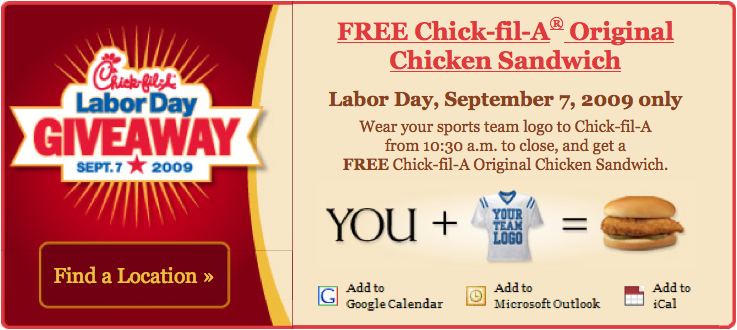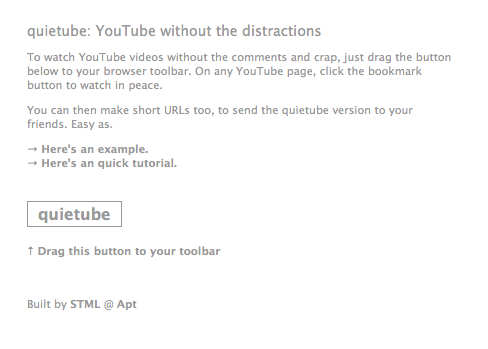I learned midday today that Chick-Fil-A was hosting a fairly bold and dramatic nationwide promotion for Labor Day: Show up = Free chicken sandwich. Nothing to buy. The only catch is that you had to arrive sporting the logo of your favorite sports team. No problem. After Saturday’s BYU-Oklahoma game (BYU 14, Oklahoma 13), donning some Cougars paraphernalia would be no sacrifice at all. 🙂

My next task is to find a local Chick-Fil-A. I’ve seen billboards on the freeway so I know there’s one nearby, but I’ve never been to it. I then realize the brilliance of the promotion. Get everyone in the area to realize that there is a Chick-Fil-A nearby and build some local Chick-Fil-A love and loyalty with a fairly modest investment per customer on their part.
Turns out my local restaurant is in the food court of the University Mall in Orem, Utah. No problem, especially since we have five cousins from up north to return home anyway. Next I have to supply sufficient BYU logos for all 12 small people. Not a problem at our house. I raid my t-shirt shelf and we’re in business.
Next stop, Orem! Avoid Labor Day freeway parking lot by taking back roads. No sacrifice because we’re heading to Orem to feed 14 people for free just because we show up in BYU gear. Starting to feel some positive vibes about Chick-Fil-A.
Arrive at the mall outside the food court and 14 of us pile out of our 15-passenger van (yes, I do own one), all decked out like it’s game day. As we near the door, an interested bystander says to me casually, “Going to Chick-Fil-A? They’re all out.” I go, “No!” in sort of mock horror. He says, “They’ll give you a coupon. Just thought you ought to be prepared.” Hmmm. Well, understandable that they might run out with such an unrestricted giveaway, although far more classy to actually stock enough chicken to get through the day. I mean it’s still hours before closing. Well, let’s go get our coupons and see what they do to make lemonade out of this.
No dice on the lemonade. I roll up to the counter while the other 13 Cougar fans in my party stand back so as to not create a mob scene at the register. Girl in the uniform sees us and says, very apologetically, “I’m sorry, we’re all out of free chicken sandwiches.” I then calmly reply, “We’ll take 14 coupons then.” She raises her eyebrows, I gesture behind me toward the cheering section, she coughs up the coupons. This is the moment when the Fail emerges. Out of curiosity I ask her if they’re completely out, or if I can still buy a chicken sandwich if I really want one. Just call it a hunch on my part. She says that, yes, in fact, I can still buy a chicken sandwich. Apparently it’s just the free ones that they ran out of. The ones you buy they still have in stock. Yikes.
I take my 14 coupons and then I look at her and say with that gentle but slightly condescending grandpa tone of face that I’m trying to perfect, “You know, if I were running the show here, I’d give away the chicken sandwiches until there wasn’t a single sandwich left for sale.” To her credit, she gives me a pained and knowing nod and says, “I know. I agree.” Much smarter play on her part than whatever management was thinking.
Meanwhile, the good cheer is just gone. I was planning on spending no cash for dinner, and now I’m standing in a food court with 12 hungry kids in tow, and the teenage boys are getting that vacant look in their eyes like they’re about to kill something large and eat it raw if necessary. I now realize that I’m about to fork out greenbacks to feed this crew because I am a doofus with no backup plan. Of course, I’ll be danged if I’m going to now go back to the Chick-Fil-A counter and order 14 chicken sandwiches (the ones you pay for, which are, in fact, in stock). So instead we slide over and cause a near riot situation at the Taco Bell counter and drop $40 there plus another $12 for my wife and me at whatever it is in the food court that’s trying to be Panda Express. 50 bucks down and all I have to show for it is a detour plus 14 coupons for mythical chicken sandwiches.
Memo to Chick-Fil-A management: If you’re going to play an incredibly bold marketing game, then play the game boldly. Stock enough chicken to feed the entire community, because in a college town people are definitely going to show up for free food. When you run out, start giving away other stuff, whatever you’ve got. It’s a make or break day. When your cupboards are completely bare, and you’ve given away the last french fry, put up a huge sign saying something like, “Thanks for your love, [your city name here]! You cleaned us out!” and then stand there cheerfully handing out the coupons to anyone that walks by with a logo on. Act like it made your day to get cleaned out by the locals on Labor Day. If that wasn’t your point, then why run such a gutsy promotion in the first place?! Instead, you come across looking chintzy when you could have been a hero and really built some customer affection. My wife is a sucker for this sort of thing, and you had her right up until, “You can still buy one if you want.” I’m not seeing her as a regular after this.
Memo to myself: Figure out a way to motivate my lab students using coupons for free chicken sandwiches…





